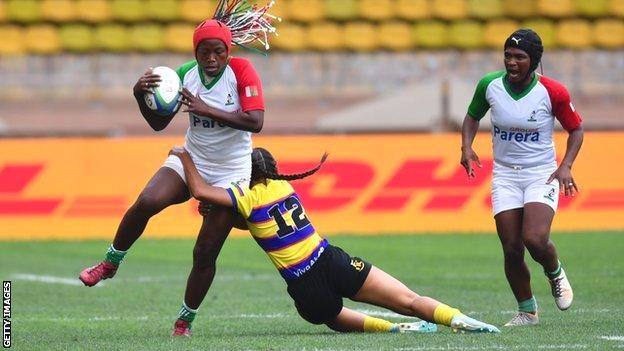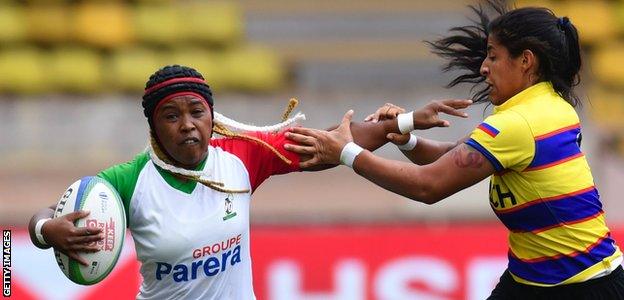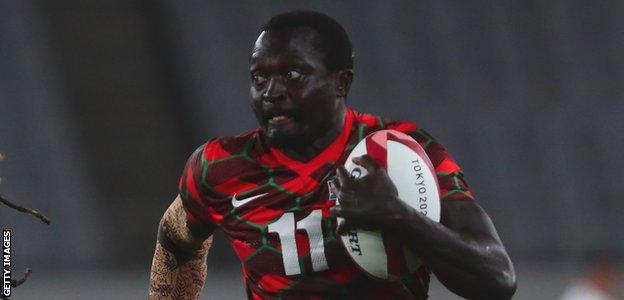Rugby World Cup Sevens: Madagascar are 'idols' even before tournament debut
- Published

Madagascar will make their Rugby World Cup Sevens debut in Cape Town, with the tournament taking place between Friday and Sunday
Madagascar's women's team are living "a dream" ahead of their inaugural Rugby World Cup Sevens participation, which begins on Friday.
The islanders and hosts South Africa are the two African representatives in the 16-team women's tournament, which ends on Sunday in Cape Town.
"It is the first time for our country that a team will be participating in a World Cup," assistant coach Zakasoa Ravelonanosy told BBC Sport Africa.
"We are very, very excited. We are in a dream. The team have become idols for little girls."
The World Cup Sevens will be held on the African continent for the very first time, with New Zealand the defending champions in both the men's and women's events from the 2018 event in San Francisco.
Madagascar reached this year's tournament after finishing second behind South Africa, who qualified automatically as hosts, at April's Rugby Africa Sevens Championship in Tunisia.
"Before we went to Tunisia, no one had any hope for us," Ravelonanosy said.
"Everyone thought we were going to participate, like every year, trying to have a good result. No one imagined that we could qualify. Everyone [was surprised] when they saw that we had."
The qualification is a historic achievement for Madagascar, where rugby is a national sport.
So popular is the sport in the island nation that the capital Antananarivo boasts the world's highest number of rugby clubs within a city, at at least 161.
However, the country has long struggled to convert its passion for the oval ball game into continental or global success, with Ravelonanosy saying that infrastructure is holding the game back.
"In rugby, we only have a little stadium and not a really great field," he said.
"After the qualification our president has promised to make our stadium bigger and better, and the government will give more help."
Trying to cause an 'earthquake'

Madagascar will face Australia, who were runners-up four years ago, in the round of 16
Improved infrastructure is among the changes Ravelonanosy hopes the World Cup Sevens qualification can bring to the country's vibrant rugby scene.
There's also expectation the women's team achievement can transcend the sport.
"We're not like in Europe, where women are empowered. Women have 'a little place' in Malagasy life," he said.
"It's our hope, because of what the girls have done, that every Malagasy woman understands the importance of women in society, and that they can do something in life not only waiting for men to do something.
"Little girls want to play rugby - to do sport - because they understand that they can do something."
The team's technical bench, which was appointed in January, believes discipline was the key to their qualification.
"The head coach is a policeman, I'm a retired from the French Foreign Legion, where I spent 20 years of my life, so we are little bit hard regarding discipline," Ravelonanosy explains.
The coach will hope to see some of this fortitude in their first match against Australia, one of the tournament favourites.
"Australia is perhaps the best team in the world, but they don't know anything about us," Ravelonanosy contends.
"It can be a surprise for them to meet us and the girls hope that we can win. If they beat us, it just normal. If we beat them, it's an earthquake for the rugby world. So, I think that pressure is on Australia, not on us."
South Africa, meanwhile, will meet France in their opening game.
Injera back to provide boost to Kenya

Collins Injera featured for Kenya's 15s side this year, helping the east Africans to a runners-up spot at the Rugby Africa Cup
In the men's tournament, Kenya, Zimbabwe and Uganda join hosts South Africa as Africa's representatives, with Kenya having been able to recall star player Collins Injera.
The 35-year-old ranks second in the World Rugby Sevens Series' all-time try scorers' list and this will be his first appearance for the sevens side since last year's Olympics.
"He's a great leader and we needed that experience in the group," Kenya sevens coach Damian McGrath told BBC Sport Africa.
"He'll help some of the younger players understand what it takes to be a top-level sevens player and I think, given this format, this is the right time to let him come back."
The men's World Cup Sevens is played in a knock-out format, with 16 lower-ranked sides playing off for a ticket to the round of 16 where the top eight teams await.
Uganda play Samoa, Kenya take on Tonga and Zimbabwe face Canada in the first round.
The new format was introduced in the 2018 edition after World Rugby did away with the round-robin style, which has divided opinion among coaches.
"I'm not a fan personally. I just feel the round-robin approach of a pool stage is much fairer and better," McGrath said.
However, Zimbabwe coach Graham Kaulback thinks one-off matches could improve his team's chances.
"The knockout format does add a lot of pressure onto the individual teams but for the lower-ranked teams like ourselves, it might be in our favour," Kaulback told BBC Sport Africa.
"If we could cause an upset against Canada, we progress.
"With the last format, playing in a pool against three core (World Sevens) Series teams, makes it that much harder to exit your group and make the quarter-finals."